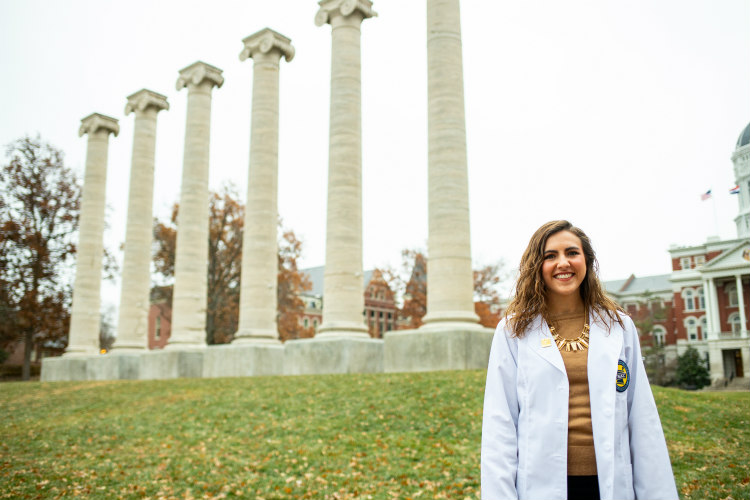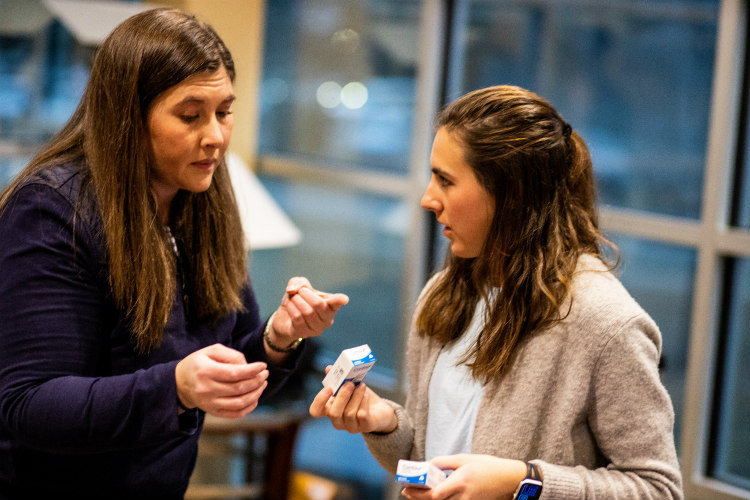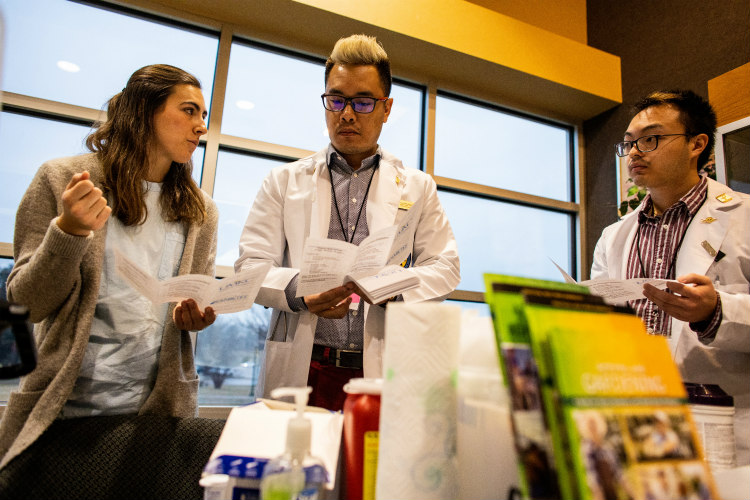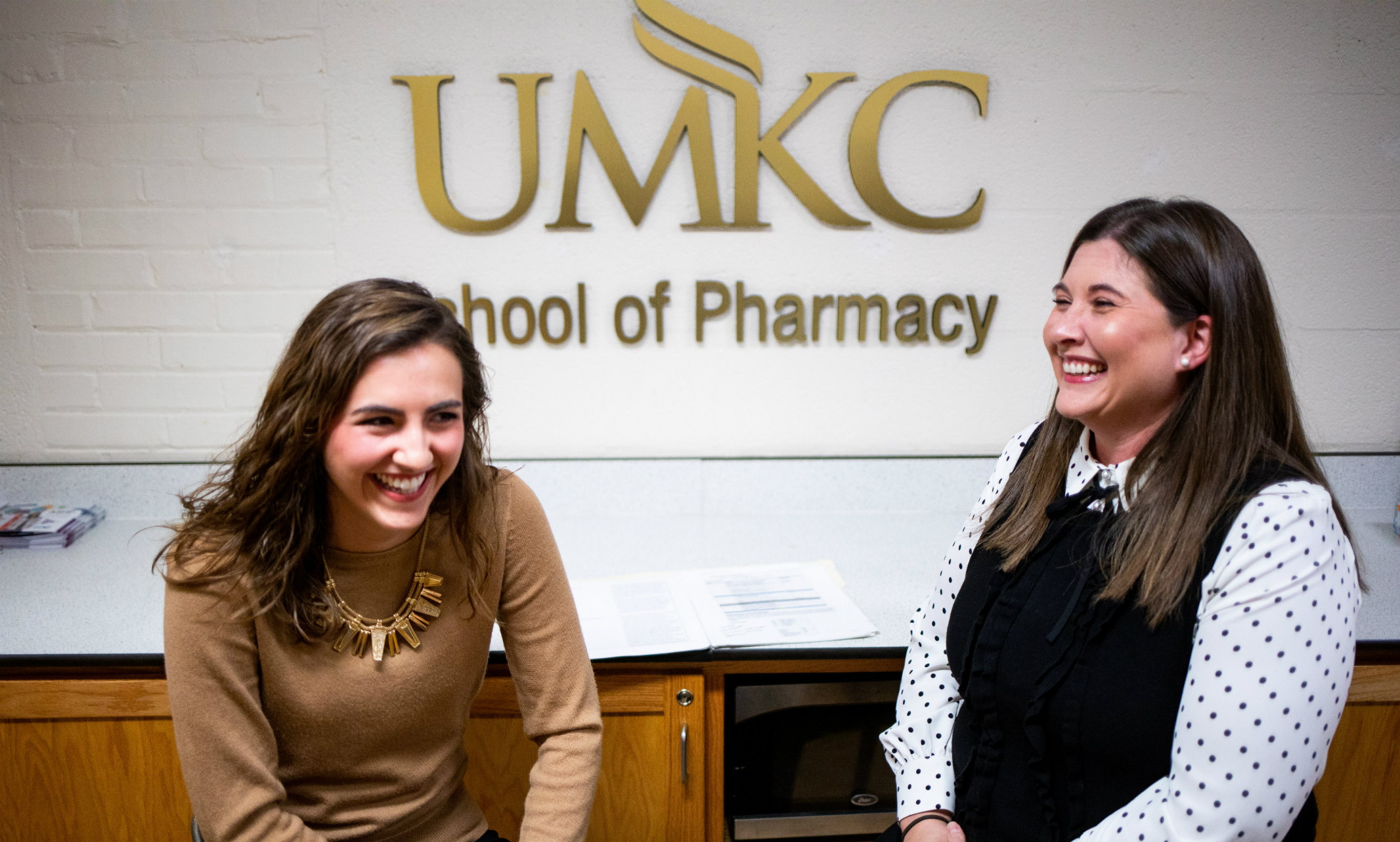The heart of UMKC is our campus community. With lots of opportunities, it’s easy to develop student mentorship teams. And these rich relationships—our Dynamic Duos—are some of our best success stories.
Growing up in a farm family, Kelly Cochran’s passion is spreading the message that rural healthcare needs to be a top priority in Missouri and throughout the U.S.
“We need to take care of the people who are feeding us,” says Cochran, a clinical associate professor at the University of Missouri-Kansas City School of Pharmacy in Columbia, Missouri. “Farmers often don’t have healthcare close by, and it’s challenging for them to take the time off to see a provider.”
So Cochran and her pharmacy students deliver health care to farmers.
They’re part of Pharm to Farm, a statewide outreach program of the Missouri AgrAbility Project, that helps farmers identify medical risks through their local pharmacist. In many rural Missouri areas, pharmacists fill healthcare gaps and are the first face farmers see for their health and safety.
“This program has inspired me to be more outgoing. Through my experiences, I feel that I am gaining communications skills that will help me as a pharmacist.”

The UMKC School of Pharmacy faculty-student teams conduct health screenings at farms and events. With Cochran’s mentorship, Cassidy Jones (PharmD ’22) planned the UMKC School of Pharmacy screening at the Great Plains Growers Conference at Missouri Western State University in St. Joseph, Missouri.
It meant scheduling shifts for students to conduct health assessments including taking blood pressure and asking questions about medication — not an easy task because it was a volunteer duty three hours from the Columbia campus and an hour away from the Kansas City location. Students from the Springfield campus work at events, too, but since this one was nearly five hours away during a break, they sat this one out.
“I started planning this event shortly after the semester began in August,” says Jones, who grew up on a small farm in Auxvasse, Missouri, about 30 minutes from Columbia.
Because Jones shows horses, it was important for her to be close to home for her studies, which is why she chose the UMKC School of Pharmacy campus at the University of Missouri in Columbia. After she graduates, she hopes to work as a pharmacist in Mexico, Missouri, surrounded by farms nearby.
“This program has inspired me to be more outgoing,” Jones says. “I am usually very shy, but in the future, I will need to have the confidence to counsel patients, consult with physicians and be a leader in the pharmacy. Through my experiences, I feel that I am gaining communications skills that will help me as a pharmacist.”
Cochran enjoys mentoring students like Jones.
“We need to take care of the people who are feeding us. Farmers often don’t have healthcare close by, and it’s challenging for them to take the time off to see a provider.”

“My favorite part is seeing students find success in their future career paths,” she says. “In particular, when they recognize their roles as servant leaders and advocates for health and medication safety among the rural communities they will serve.”
At the growers conference, Jones lugged in a rolling cart filled with boxes of supplies and pamphlets that filled the trunk of the car she shared with Cochran on the drive from Columbia. One leaflet was called “Standing Tall to Prevent Falls,” the most frequent accident to occur on farms. Another was “Better Sleep for the Farmer Stuck Counting Sheep” about sleep hygiene — a study found that farmers who slept less than normal experienced 7.4 times higher risk of having balance issues, which could lead to poor work or an injury.
Jones and others set up wayfinding signs to the UMKC School of Pharmacy health-screening area, tucked away from the flow of the conference to give farmers and growers privacy.
“You might want to walk around and let people know we’re here,” Cochran suggested to Jones. “They’ll probably respond to students better than a faculty member like me.”
Soon after Jones launched her recruiting mission, men and women trickled in.
“I haven’t been to a doctor in eight years,” says Matthew Shoop, a row-crop farmer from Platte County. After his screening, he says health screenings are needed for farmers like him. Stress, among others things, is common because of the unpredictability that goes hand in hand with the career.
“If not for this screening, I don’t know when I would have been seen.”
“My favorite part is seeing students find success in their future career paths. In particular, when they recognize their roles as servant leaders and advocates for health and medication safety among the rural communities they will serve.”

The Need for Rural Health Care in Missouri
By the Numbers
98 of 101 Rural counties in Missouri are considered primary care Health Professional Shortages Areas.
2- to 4-fold Medicine can increase risk of injury while using farm equipment.
10+ Miles that many of Missouri’s residents live from the nearest drugstore. Many rural residents live even farther from primary-care doctors and specialists.
Health of Farmers
Common issues
- Chronic obstructive pulmonary disease and diabetes are more prevalent in rural areas.
- Incontinence, sleep deprivation, pain and heart disease increase the rate of farm accidents.
- Medicines often cause dizziness, confusion, drowsiness, blurred vision, lightheadedness and gait problems — increasing injuries on farms.
- Farmers’ stoic nature often prevents sharing health concerns with family members and friends.
UMKC School of Pharmacy care through Pharm to Farm faculty and students
- They help farmers identify medicines that might be of risk to them.
- They talk about ways to improve safety on the farm.
- They conduct health screenings.
- They work with pharmacists raised in non-rural areas to teach them about farm values: independence, pride, thrift, skepticism and a strong work ethic.
- They also talk about safety barriers in rural settings such as long work hours and seasonal deadlines.

